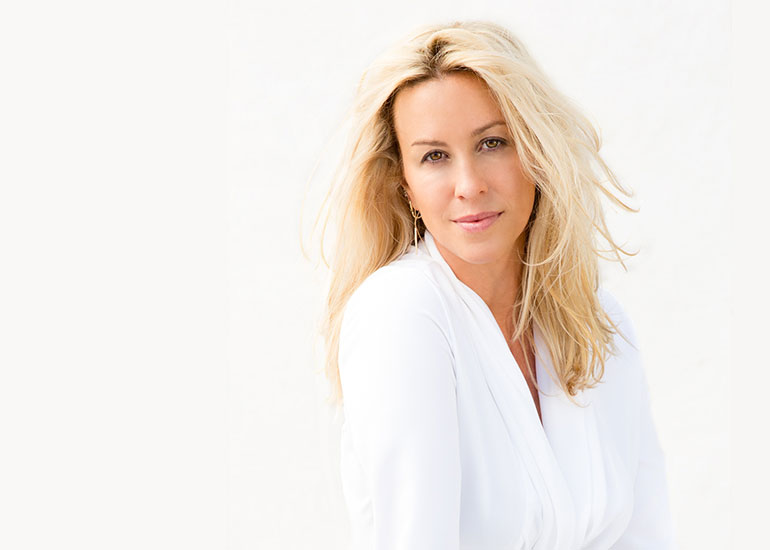
Alanis Morissette is most well-known for her autobiographical songwriting and passionate performances, as well as her evocative and engaging articles, interviews, and public speaking events. Her music has won seven Grammys. She is also a charitable activist who has supported causes that focus on empowerment, art, recovery, psychological and spiritual healing, feminism, relationships, and environmental causes—earning her a Global Tolerance Award from the United Nations. Alanis Morissette: I think it was a validation of our humanity, on some level. For me to wrap my head around what created the zeitgeist—I can't even come close. I have absolutely no idea, but I can make some educated guesses. I was writing about my own microcosmic experience. When I write songs, I'm just writing for myself. They are the equivalent of a musical diary entry. And then once I share the song, it belongs to whomever is listening to it. I came quickly to understand that I wasn't alone in my challenges or suffering or pain. The experience opened me up, in a direct way, to how many people were suffering—and my career quickly anchored itself around wanting to consciously be a part of alleviating the suffering I began to more deeply sense. Alanis Morissette: I think it's obvious to anyone who's noticing that culture has changed over the last 20 years. Consciousness is raising. The hood is being looked under, and the veil of conditioning is slowly lifting. It's going to take many, many years for this horror of conditioning to really turn around. The horror is the disallowance of our essential selves being expressed. What's happening now in culture, in the feminist movement, and in the consciousness movement, is that people are slowly moving toward awareness of their essential selves, which feels so liberating to me. Doing so leaves room for feelings and proprioceptive embodiment, mindfulness, all of these fantastic words that basically describe the idea of us coming home to ourselves, coming home to our bodies, not having to split off, not having to fight, flight, or freeze, healing traumas, recognizing what the traumas even are that keep us from living in a connected, inspired, and fulfilling way. Alanis Morissette: Oh, it is definitely a compliment. Anger is such a vital, powerful, light-filled life force. It can be labeled as feistiness or—in my experience—as passion, and it's a kick-starter. Anger can kick-start so many forms of activism. It can kick-start art. It can kick-start a scary conversation. It can kick-start someone setting boundaries. Every artist I know is angry on some level. The two life forces that move worlds, in my mind, are love and anger. To me, anger is a gorgeous indication of something needing to change. And then it becomes about following up with, well, what does need to change? What boundary needs to be set? What clarification needs to be expressed? What activism ultimately is being born within me or within a culture? Anger has helped me write a lot of songs. To write songs is such a generative fiery act for me. The only anger that would encumber me would be the acting out of anger that is destructive by behaving disrespectfully toward someone—ignoring their boundaries sexually, physically, emotionally, or intellectually. When anger is acted out, it's offensive and nobody wins. Alanis Morissette: I have been part of this conversation for as long as I can remember, and my art and service has always been oriented toward this. I used to hide it. There was much more of a split in the '90s. It was compartmentalized, like—you're a rock and roll musician, or you're an academic, or you're a dancer, or you're a spiritual teacher. It's almost as though you had to pick which egoic identity you wanted. There seems to be more of a capacity to "hold the complexity" now—to allow for an integrated, multitudinous life and lifestyle. A painter can be a chef and be a scientist, and a scientist can, heaven forbid, talk about spirituality, and a yogi can be all about carpentry or neuroscience. It's wildly exciting. I think student and teacher are opposite sides of the exact same coin. So, my teaching is hollow if I'm not an avid student, and my studentship is a constant. I love chasing the big questions—there's not a day that goes by when I'm not reading or researching or writing or philosophically thinking about something. Alanis Morissette will be teaching Exploring self and Self with Ann Randolph and Justin Hilton, March 2 – 4, 2018 at 1440 Multiversity. This interview was conducted by Kate Green Tripp, Managing Editor for 1440 Multiversity.
1440: The release of Jagged Little Pill cemented you as an international music sensation. The iconic songs on that record resonated for millions. How do you think your work spoke to the cultural climate of the time? What do you believe people were needing to hear?
1440: What cultural moment do you see your work speaking to now? What do you believe people need to hear today?
1440: For years, your lyrics and your message were described as angry. You have made a clear point to reframe that label as a compliment. Can you tell us more about that? How has anger served as a tool in your life? How has it encumbered you?
1440: These days you are spending much more of your time publicly contributing to the conversation around consciousness and spirituality. How and why did you make that shift? What led you to want to speak and teach?
Stay Informed
Sign up and receive insider offers and flash sales in your inbox every week